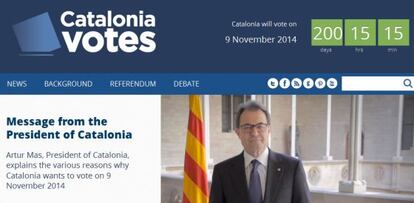Catalan government looks abroad for independence support
New website in English, French and German argues case for holding referendum later this year

In a bid to garner international support for its campaign for a referendum on independence for the region, the Catalan government has set up a website called www.cataloniavotes.eu in French, German and English.
The site argues that the sovereignty process is not simply politicking, but reflects the broader wishes of the people of Catalonia. Aside from making the case for independence and providing background on the process, the site includes lessons on Catalan history, as well as an overview of the region¡¯s culture. There are also interviews with politicians and figures from public life, who explain why they support independence.
¡°Catalonia has one of the oldest parliaments in the world, its own culture, language, and civil code,¡± says regional premier Artur Mas. ¡°The majority of Catalans want the right to vote in the referendum.¡±
The Catalan government wants the status vote to take place on November 9. On April 12, the Catalan National Assembly laid out a roadmap for the sovereignty process, which says it wants Catalonia to officially declare independence from Spain by April 23, 2015.
But on April 8, the two biggest parties in Madrid, the ruling Popular Party (PP) and the opposition Socialists, jointly rejected Catalonia¡¯s push for an independence referendum in a 299-47 vote in Congress.
The site includes lessons on Catalan history, as well as an overview of the region¡¯s culture
Surveys suggest that around three quarters of Catalans believe they should be given a say over their relationship with Spain. Calls for independence in Catalonia, which accounts for a fifth of the country¡¯s economic output, have grown during Spain¡¯s prolonged economic recession, which has seen major cuts in public spending.
The 2014 referendum would ask two questions: ¡°Do you want Catalonia to be a state?¡± and ¡°Do you want that state to be independent?¡±
A range of pro-independence civic organizations have lent their support to the website, including the National Catalan Assembly, ?mnium Cultural and S¨²mate, along with the Confederation of Barcelona Neighborhood Associations, the Foundation for Peace, as well as the Catalan branches of Spain¡¯s two main labor unions, the UGT and the CCOO, arguing that the Spanish Constitution no longer provides a role for Catalonia within Spain.
In a brief message, UN Secretary General Ban Ki-moon says that all peoples around the world have the right to decide on how they should be governed.
Political parties opposed to Catalan independence are absent from the website. Maurici Lucena, the Socialist Party¡¯s spokesman in Catalonia, describes the pro-referendum campaign as ¡°hypocrisy,¡± saying: ¡°All these people throwing their weight behind the referendum admit in private that there will be no referendum.¡±
Enric Millo, the PP¡¯s spokesman in the Catalan regional parliament, dismisses the web launch as ¡°undermining any hope of meaningful dialogue over the question of independence and a referendum.¡±
Tu suscripci¨®n se est¨¢ usando en otro dispositivo
?Quieres a?adir otro usuario a tu suscripci¨®n?
Si contin¨²as leyendo en este dispositivo, no se podr¨¢ leer en el otro.
FlechaTu suscripci¨®n se est¨¢ usando en otro dispositivo y solo puedes acceder a EL PA?S desde un dispositivo a la vez.
Si quieres compartir tu cuenta, cambia tu suscripci¨®n a la modalidad Premium, as¨ª podr¨¢s a?adir otro usuario. Cada uno acceder¨¢ con su propia cuenta de email, lo que os permitir¨¢ personalizar vuestra experiencia en EL PA?S.
En el caso de no saber qui¨¦n est¨¢ usando tu cuenta, te recomendamos cambiar tu contrase?a aqu¨ª.
Si decides continuar compartiendo tu cuenta, este mensaje se mostrar¨¢ en tu dispositivo y en el de la otra persona que est¨¢ usando tu cuenta de forma indefinida, afectando a tu experiencia de lectura. Puedes consultar aqu¨ª los t¨¦rminos y condiciones de la suscripci¨®n digital.








































